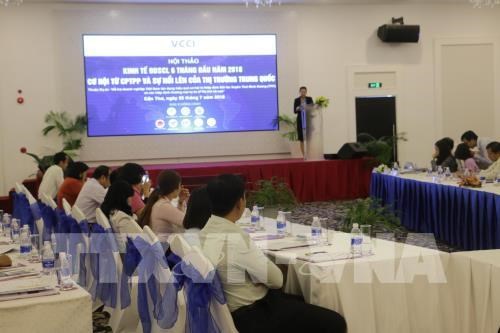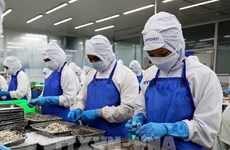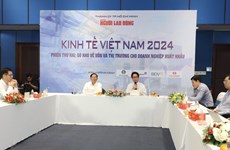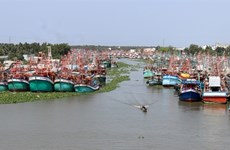Seminar helps Mekong Delta firms grasp chances from CPTPP
A seminar was held in Can Tho city on July 25 to help enterprises in the Mekong Delta seize opportunities from the Comprehensive Partnership and Trans-Pacific Partnership (CPTPP) trade agreement and take advantage of the vast Chinese market.
 At the seminar (Photo: VNA)
At the seminar (Photo: VNA)Can Tho (VNA) – A seminar was held in Can Tho city on July 25 to help enterprises in the Mekong Delta seize opportunities from the Comprehensive Partnership and Trans-Pacific Partnership (CPTPP) trade agreement and take advantage of the vast Chinese market.
Attending the event, hosted by the Vietnam Chamber of Industry and Commerce’s branch in Can Tho (VCCI Can Tho), were leaders from VCCI Can Tho, economic experts, and representatives of the city Departments of Planning and Investment, and Industry and Trade, as well as associations of enterprises and enterprises from provinces and cities in the region.
The delegates discussed the CPTPP’s impacts on some key industries in the Mekong Delta as well as advantages and challenges of Vietnamese products exported to Chinese market.
Phung Thi Lan Phuong, head of the FTA Division of the WTO and Integration Centre of the VCCI, said the CPTPP was viewed as a better option for Vietnam and its 10 other member countries, following the US withdrawal from the former Trans Pacific Partnership (TPP).
She said the CPTPP would enable Vietnam to sign three new free trade agreements (FTA) with Canada, Mexico, Peru and seven upgraded FTAs with other members.
The CPTPP brings benefits from reduced tariffs, which could increase Vietnam’s GDP by 1.1 percent annually. Though this number is less than one-sixth of the same benefits the former TPP had promised, the CPTPP may help boost the country’s institutional economic reform, she said.
She also said, however, it would be a challenge for the Vietnamese business community to take full advantage of the CPTPP.
The task of implementing the deal is of great importance for domestic enterprises.
Economic growth dynamics in Vietnam Nam are still lacking because of low labour productivity and over-dependence on the world economy and the foreign-invested sector, according to Phuong.
The country must improve productivity and administration, and demonstrate an overall commitment to the free trade conditions of the agreement, she said.
On March 8, 2018, Vietnam and 10 other economies signed the CPTPP. If six countries approve it by the end of 2018, the CPTPP will come into effect in 2019.
CPTPP, also known as TPP-11, is an open free trade agreement (FTA) whereby countries can join after the agreement enters into force if they accept its standards and member countries agree.
The 11 signatories to the CPTPP include Australia, Brunei, Canada, Chile, Japan, Malaysia, Mexico, New Zealand, Peru, Singapore and Vietnam.
Also at the event, results of a survey conducted by VCCI Can Tho were released, showing that most enterprises in the Mekong Delta are optimistic about their business prospects in the second half of the year.
Nguyen Phuong Lam, Deputy Director of VCCI Can Tho, said according to the survey of 62 companies in the Mekong Delta conducted by the VCCI, more than 83 percent of businesses said they had stable business production in the first half of the year.
Of the figure, 41.9 percent of the enterprises said business results had been better during this time; 45.2 percent said they had stayed the same; and 12.9 percent said it had been worse than the same period last year.
More than 90 percent of businesses said that business results would be better in the second half of the year, while 9.7 percent said it would be worse.
According to the survey, 80 percent of the enterprises plan to keep their current production scale, while 20 percent will expand production in the second half.
In the second half of the year, 30 percent of businesses said they would increase their sales by around 25 percent or less (mainly seafood, rice and garment makers), while 14 percent said they would increase sales by more than 25 percent.
Ten percent of businesses said their profits would remain unchanged; 34 percent said their profits would increase; and 14 percent said their profits would decrease, according to the survey.
Most of the companies said they had experienced some difficulties because of fluctuating prices of materials, as they are dependent on imported raw materials. Meanwhile, fishery enterprises said they faced difficulties in consumption.
In the first half of the year, the region’s export turnover reached 8.2 billion USD, a year-on-year increase of 1.45 billion USD. The figure is expected to hit 17 billion USD by the end of the year.-VNA












